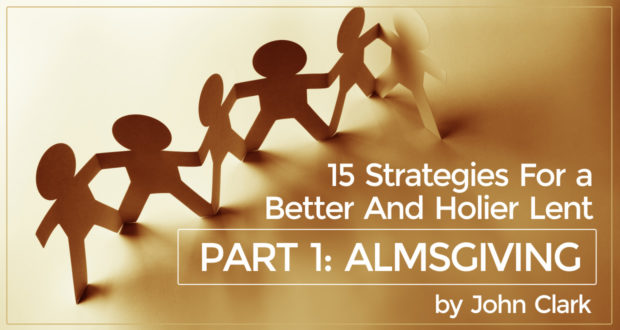Lent calls us to focus on three areas to develop our spirituality: prayer, fasting, and almsgiving. In my next three columns, I am going to offer five ideas on each of these.
Let’s begin with the one that often gets the least attention: almsgiving.
Lent offers us an opportunity to focus on the poor among us, yet many of us forget to take advantage of that opportunity. We need to make this the Lent that we remember. This Lent, let’s help our brothers and sisters who are living in poverty. Below are five strategies for participating in almsgiving.
1. Help pay a medical bill.
There is no shortage of people who are overwhelmed by medical debt. Get in touch with local charities and let them know that you would like to help with medical expenses. Even if it is just a few dollars, it helps alleviate the financial burden of others.
2. Pay another’s utility bill.
Many utility companies have programs that allow people to help pay the utility bills of the poor. What a wonderful idea.
3. Work in a soup kitchen.
Pope Francis has implored the faithful not only to help the poor materially, but to work among them. What better way than a soup kitchen, where we have the opportunity to serve the poor, whom Christ loves so much.
4. Give away clothes and shoes.
Many of us have clothes that we have been meaning to give away for months or even years. Let’s stop putting it off. In the first week of Lent, get your old clothes together and donate them. Poor people need them right now.
5. Be the one who needs alms.
There are probably many lists of ways to help the poor, but the role that the poor can play in almsgiving is often unaddressed.
There is a saying: “I’ve been rich and I’ve been poor. Rich is better.” Cited as a pithy truism, I’m not sure this is true. At least not for everyone.
Scripture argues that—for some people—rich was worse. For instance, the rich man in Luke 16:19-31 knew that Lazarus was at his gate, sick and starving; yet the rich man was unmoved to pity.
The rich young ruler in Luke 18:18-23 asked Jesus what he must do for eternal life; to which Jesus responded that he should sell his belongings, give the money to the poor, and follow Him. Because he was very rich, the young ruler walked away sad. He felt that Jesus was asking just too much. In both cases, their wealth could have been an aid to eternal life, yet they used their wealth as a detriment. “Rich” could have been better. But for them, “rich” was worse.
In my life, I have known neither extreme of great wealth or of dire poverty. But at different times of my life, I have been both the almsgiver and the alms-receiver. What I have realized is that whether I receive with the virtue of humility, or give with the virtue of charity, I have grown closer to Jesus.
Almsgivers and alms-receivers need each other. When the poor allow the wealthier to help them, they are granting the wealthy a much greater gift than material goods can provide.
God puts people in our lives who can assist us in our salvation. Lazarus stood at the rich man’s gate, and because the rich man would not go out to that gate to see Lazarus, he did not enter the gate of Heaven. The question we need to ask ourselves is: Where are the gates in my life? Because they are there.
Rich or poor, every person in our lives can assist us in our salvation. And we can assist every person in our lives with their salvation.
Rich or poor, we are not mere footnotes to the story of each other’s souls. We help write each other’s stories, and each chapter is very much our own choice. We can choose whether we are main characters in their stories of salvation, or mere extras that linger in the background. Whatever side of almsgiving we are on, it is our chance to help others on the road to Heaven.
I wrote a short prayer for the poor that I wish to share with you:
Dear Jesus, I know that You have a special love and affection for the poor.
Please grant me the grace to develop a special love and affection for the poor in my own heart.
Grant me the vision to see my brothers and sisters who are in need today, and grant me the wisdom to know how I can help them.
Let me hear the cries of the poor, and help me rush to their aid.
Let everything I do for others be motivated by a pure love of You.
Please comfort the poor with a deeper knowledge of the wealth of Your love.
And please hold us all close to your Sacred Heart.
Dear Jesus, I am the least of your brothers.
Have mercy on me.
Hand-in-Hand image © Les Cunliffe / Dollar Photo Club

 Seton Magazine Catholic Homeschool Articles, Advice & Resources
Seton Magazine Catholic Homeschool Articles, Advice & Resources
